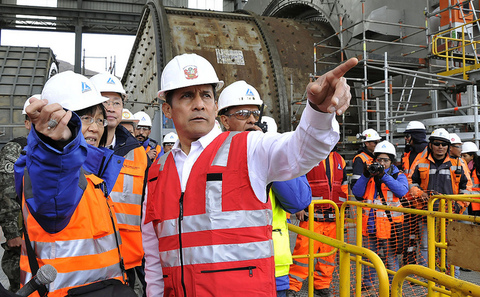In his latest book, China on the Ground in Latin America: Challenges for the Chinese and Impacts on the Region, US scholar Evan Ellis boldly concludes that something new is taking place in China’s 5,000 year history.
As a result of increasing globalisation and the role China is forging for itself in the changing global order, more Chinese lives are dependent on, or interdependent with, other peoples’ lives around the world than ever before. China must secure reliable sources of petroleum, metals, minerals, foodstuffs and access to new markets, among other things, and this may seriously challenge what Ellis calls the Chinese government’s ‘longstanding policy of non-intervention in the affairs of other states.’
‘Historically, China has never operated in a strategic environment in which its prosperity, and perhaps even its regime survival, depended on the success and well-being of its commercial representatives in distant parts of the world,’ he writes.
Ellis’s book illustrates just how important one part of the world – Latin America and the Caribbean – is rapidly becoming to China. The main thrust of his argument is that the relationship between the two regions has entered an entirely new phase from about 2009 onwards, as Chinese companies have begun to establish a ‘significant’ physical presence in Latin America across a wide variety of sectors ranging from petroleum to telecommunications and logistics.
In part 1 Ellis runs through these sectors one-by-one, country-by-country, listing Chinese acquisitions and operations in almost dizzying detail. According to him, it is in the extractive sectors – petroleum, mining and agriculture – that the Chinese have ‘most focused efforts’ in ‘building their physical presence.’
In the petroleum sector particularly noteworthy is Ecuador, where Chinese companies own the most modern of the two main pipelines as well as rights to several oil concessions, and Chinese banks are funding a huge new refinery, and a whole series of Chinese petroleum service firms are doing subcontracting work.
Another key way the Chinese physical presence is growing is through massive ‘loan-backed construction’ of public buildings, transport infrastructure, and commercial facilities. Some such loans have been made directly to the companies, others to governments, and they have been for a huge variety of projects ranging from resorts in the Bahamas to hydroelectric dams in Ecuador.
‘The officials contracting with the Chinese do not need to concern themselves with lengthy and often invasive processes of applying for loans from traditional Western institutions such as the International Monetary Fund or the World Bank,’ Ellis writes. ‘To the extent that their own laws and policies permit it, or can be circumvented, the officials simply ‘sign on the line.’ The Chinese self-finance and execute the project to be repaid by the export of commodities such as petroleum.
What, then, does all this add up to? Ellis’s answer is Part 2: major challenges for China’s government, Chinese people living in Latin America and Chinese companies operating there.
The latter include the kind of challenges facing any company, such as labour disputes, opposition from local communities, and even threats to security from guerillas. In addition, Ellis identifies several factors making it harder for Chinese companies in particular. These include comparative lack of experience in the region, a ‘general distrust toward the Chinese’, unacceptable work-place practices, and the Chinese’s focus on the extractive sectors – which arguably generate the most controversy and opposition.
As for China’s government, the main challenge identified by Ellis is sticking to its ‘non-intervention’ policy, now that so many Chinese interests and people are based abroad and vitally connected to what goes on there. But just how far might the government go to defend its interests? As far as the US’s or the UK’s? Might the 21st century become one of China-backed coups?
Ellis says it is ‘doubtful’ military intervention or ‘forcible attempts to change the region’s political leadership’ would be tolerated by the US. But the Chinese presence is enabling Latin American countries to pursue greater independence from the US, and that the latter is watching ‘nervously.’
Environment and human rights issues sidelined
One concern though: while Ellis acknowledges that one challenge facing Chinese companies comes from ‘environmentalists and local communities’, no specific mention is made of certain international human rights obligations that are binding in scores of Latin American countries and relevant to millions of people. For example, the International Labour Organization’s Convention 169 gives indigenous people the right to be consulted about measures ‘that may affect them’, and has been ratified by 15 countries in the region. Similarly, rulings by the Inter-American Court of Human Rights, which apply in the 25 countries to have ratified the Inter-American Convention on Human Rights, accords indigenous people the right to give their consent to projects affecting them.
True, it is the host government’s responsibility to ensure these legal obligations are met, but Chinese companies stand in violation of indigenous peoples’ rights if they operate in areas where consultation has not been done or where consent has not been obtained. Isn’t understanding and respecting these legal obligations one of the most important challenges for Chinese companies in Latin America, especially given the widespread failure of so many governments and companies already operating there to do so? Ellis refers to Latin American officials ‘simply signing on the line’ when laws permit it, but the point is, if indigenous people are involved, the laws very often don’t permit it.
One further concern is that Ellis is sometimes rather over-optimistic about how Chinese companies are responding to ‘day-to-day management challenges’. He refers to ‘Chinese efforts [in the petroleum sector] to build ever more robust relationships with local communities’, and cites China's Ministry of Foreign Affairs reporting Chinese firms providing ‘financial support to improve medical conditions in indigenous settlements along the Corrientes River’ in Peru.
However, in reality, the Corrientes is what you might call a ‘horror show’, in both environmental terms and how local inhabitants are being treated, and it takes some doing to cite it as an example of ‘robust’ community relations or some financial support as a sincere attempt to address local concerns.
After more than 40 years of oil operations, the Corrientes has been devastated. When alarming levels of cadmium, barium, zinc and arsenic were found in the water last year, an environmental emergency was declared. Indigenous people living in the region are demanding a clean-up, but that demand, like so many others, goes unheard. Meanwhile, the oil keeps pumping and the Chinese company holding a major stake – CNPC – makes a proverbial killing.
Finally, it’s essential to point out that, considerable as the challenges may be for the Chinese in Latin America, the challenges are much greater for Latin Americans. For people whose homes and land are flooded to make way for a dam, or whose forest is chopped down to drill gas, or whose river is contaminated by toxic waste waters, these challenges are matters of survival for whole communities, even peoples.
















